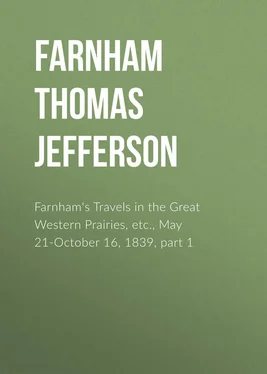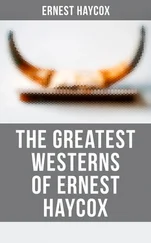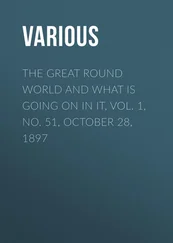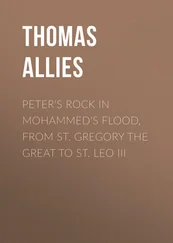Thomas Farnham - Farnham's Travels in the Great Western Prairies, etc., May 21-October 16, 1839, part 1
Здесь есть возможность читать онлайн «Thomas Farnham - Farnham's Travels in the Great Western Prairies, etc., May 21-October 16, 1839, part 1» — ознакомительный отрывок электронной книги совершенно бесплатно, а после прочтения отрывка купить полную версию. В некоторых случаях можно слушать аудио, скачать через торрент в формате fb2 и присутствует краткое содержание. Издательство: Иностранный паблик, Жанр: foreign_antique, foreign_prose, Путешествия и география, на английском языке. Описание произведения, (предисловие) а так же отзывы посетителей доступны на портале библиотеки ЛибКат.
- Название:Farnham's Travels in the Great Western Prairies, etc., May 21-October 16, 1839, part 1
- Автор:
- Издательство:Иностранный паблик
- Жанр:
- Год:неизвестен
- ISBN:нет данных
- Рейтинг книги:3 / 5. Голосов: 1
-
Избранное:Добавить в избранное
- Отзывы:
-
Ваша оценка:
- 60
- 1
- 2
- 3
- 4
- 5
Farnham's Travels in the Great Western Prairies, etc., May 21-October 16, 1839, part 1: краткое содержание, описание и аннотация
Предлагаем к чтению аннотацию, описание, краткое содержание или предисловие (зависит от того, что написал сам автор книги «Farnham's Travels in the Great Western Prairies, etc., May 21-October 16, 1839, part 1»). Если вы не нашли необходимую информацию о книге — напишите в комментариях, мы постараемся отыскать её.
Farnham's Travels in the Great Western Prairies, etc., May 21-October 16, 1839, part 1 — читать онлайн ознакомительный отрывок
Ниже представлен текст книги, разбитый по страницам. Система сохранения места последней прочитанной страницы, позволяет с удобством читать онлайн бесплатно книгу «Farnham's Travels in the Great Western Prairies, etc., May 21-October 16, 1839, part 1», без необходимости каждый раз заново искать на чём Вы остановились. Поставьте закладку, и сможете в любой момент перейти на страницу, на которой закончили чтение.
Интервал:
Закладка:
Was Nootka Sound embraced among the places referred to in this article? That was the only settlement on the North-West Coast, of the subjects of Spain or England, made between the month of April, 1787, and the date of the treaty, and was undoubtedly embraced in the Fifth Article. And so was the remainder of the coast, lying northward of Nootka, on which Spain had claims. It did not extend south of Nootka Sound. Not an inch of soil in the valley of the Columbia and its tributaries was included in the provisions of the treaty of 1763.
Our next inquiry relates to the nature and extent of the rights at Nootka, and northward, which England acquired by this treaty. They are defined in the concluding phrase of the article before cited. The subjects {xv} of both the contracting Powers "shall have free access, and shall carry on their trade without disturbance or molestation." In other words the subjects of England shall have the same right to establish trading posts and carry on a trade with the Indians, as were, or should be enjoyed by Spanish subjects in those regions. Does this stipulation abrogate the sovereignty of Spain over those territories? England herself can scarcely urge with seriousness a proposition so ridiculously absurd. A grant of an equal right to settle in a country for purposes of trade, and a guarantee against "disturbance" and "molestation," does not, in any vocabulary, imply a cession of the sovereignty of the territory in which these acts are to be done.
The number and nature of the rights granted to England by this treaty, are simply a right to the joint occupancy of Nootka and the Spanish territories to the northward, for purposes of trade with the Indians; a joint tenancy, subject to be terminated at the will of the owner of the title to the fee and the sovereignty; and, if not thus terminated, to be terminated by the operations of the necessity of things – the annihilation of the trade {xvi} – the destruction of the Indians themselves as they should fall before the march of civilisation. It could not have been a perpetual right, in the contemplation of either of the contracting parties.
But there are reasons why the provisions of the treaty of 1763 never had been, and never can be binding on the United States as the successors of Spain in the Oregon territory.
There is the evidence of private gentlemen of the most undoubted character to show, that Spain neither surrendered to England any portion of Nootka, or other parts of the north-west coast; for that if she offered to do so, the offer was not acted upon by England; and testimony to the same effect in the debates of the times in the Parliament of Britain, in which this important fact is distinctly asserted, authorise us to declare that the treaty of 1763 was annulled by Spain, and so considered by England herself. And if England did not mean to show the world that she acquiesced in the non-fulfilment of Spain, she should have re-asserted her rights, if she thought she had any, and not left third parties to infer that she had quietly abandoned them. The United States had every reason to infer {xvii} such abandonment; and in view of it, thus manifested, purchased Oregon of Spain. Under these circumstances, with what justice can England, after the lapse of nearly half a century, come forward and demand of the successor of Spain rights in Oregon which she thus virtually abandoned – which were refused by Spain, and to which she never had the shadow of a right on the score of prior discovery, occupancy or purchase? The perpetually controlling and selfishness of her policy is the only plea that history will assign to her in accounting for her pretensions in this matter.
England also places her claim to Oregon upon the right of discovery. Let us examine this: —
The first English vessel which visited that coast was commanded by Francis Drake. He entered the Pacific in 1770 15 15 This date is incorrect. It was in 1577; and he sailed to the 48th parallel of north latitude. – English Editor.
and sailed up the coast to the 45th parallel of north latitude, and then returned to the 38th degree; accepted the crown of the native Prince in the name of his Queen – called the country New Albion, returned to England and was knighted.
{xviii} The portions of Oregon seen by Drake had been seen and explored by the Spaniards several times within the previous thirty years. 16 16 Much has been written on Drake's famous voyage of circumnavigation (1577-80), when first of any known Englishmen he explored the North-west Coast of America, searching for a North-west passage. Bancroft concludes ( North-west Coast , p. 145) that he did not go north of 43° north latitude. See also on this subject, Julian S. Corbett, Drake and the Tudor Navy (New York, 1898), i, p. 306; and especially Miller Christy, Silver Map of the World (London, 1904), p. 20, wherein, on the evidence of the chart, Drake's voyage is traced as far north as 48°. For Drake's Bay, see our volume vi, p. 257, note 66. – Ed.
Sir Thomas Cavendish next came upon the coast; but did not see so much of it as Drake had seen. 17 17 It is generally conceded that Sir Thomas Cavendish's freebooting expedition of 1587 did not proceed north of the peninsula of Lower California. – Ed.
The celebrated Captain Cook followed Cavendish. He saw the coast in latitude 43 and 48 degrees. He passed the Straits de Fuca without seeing them, and anchored in Nootka Sound on the 16th February, 1779. 18 18 He was killed on the 14th February, 1779. – English Ed.
In trading with the Indians there, he found that they had weapons of iron, ornaments of brass, and spoons of Spanish manufacture. Nootka had been discovered and occupied by the Spaniards four years before Cook arrived.
The subsequent English navigators – Messrs. Vancouver, 19 19 For Vancouver see Franchère's Narrative , given in our volume vi, p. 184, note 2. – Ed.
and others, so far as the Oregon coast was the field of their labours, were followers in the tracks pointed out by the previous discoveries of the Spaniards.
So ends the claim of England to Oregon, on the right of prior discovery. As opposed to England, Spain's rights on this principle were incontestible.
{xix} By the treaty of Florida, ratified February 22nd, 1819, Spain ceded to the United States her right in the Oregon territory, in the following words: "His Catholic Majesty cedes to the said United States all his rights, claims, and pretensions to any territories east and north of said line;" meaning the 42nd parallel of north latitude, commencing at the head waters of the Arkansas, and running west to the Pacific; "and for himself, his heirs and successors, renounces all claim to the said territories for ever."
But the United States have rights to Oregon which of themselves annihilate the pretensions not only of England but the world. Her citizens first discovered that the country on which Nootka Sound is situated was an island; they first navigated that part of the Straits of Fuca lying between Puget's Sound and Queen Charlotte's Island, and discovered the main coast of north-west America, from latitude 48° to 50° north. American citizens also discovered Queen Charlotte's Island, sailed around it, and discovered the main land to the east of it, as far north as latitude 55°. 20 20 Farnham here refers to the voyages of the "Columbia" and "Washington" (1787), sent out by Boston merchants under command of Captains John Kendrick and Robert Gray. After wintering at Nootka (1788-89), Gray explored the coast to the northward. Unaware of earlier English explorations, he christened Queen Charlotte's as Washington Island. The question of Kendrick's exploration (1790) of Puget Sound is much in doubt. Farnham makes a specious plea at this point – his cited authority, Greenhow, admits the discovery (1787) of Queen Charlotte's Island by Dixon, and by Berkely (1787) of the Straits of Juan de Fuca. A recent historian of Oregon (H. S. Lyman, History of Oregon , ii, p. 93), however, claims that the Americans by their boldness of exploration and exact charting of the northern shores, were the real discoverers of the territory as far as 54° 40´. – Ed.
Интервал:
Закладка:
Похожие книги на «Farnham's Travels in the Great Western Prairies, etc., May 21-October 16, 1839, part 1»
Представляем Вашему вниманию похожие книги на «Farnham's Travels in the Great Western Prairies, etc., May 21-October 16, 1839, part 1» списком для выбора. Мы отобрали схожую по названию и смыслу литературу в надежде предоставить читателям больше вариантов отыскать новые, интересные, ещё непрочитанные произведения.
Обсуждение, отзывы о книге «Farnham's Travels in the Great Western Prairies, etc., May 21-October 16, 1839, part 1» и просто собственные мнения читателей. Оставьте ваши комментарии, напишите, что Вы думаете о произведении, его смысле или главных героях. Укажите что конкретно понравилось, а что нет, и почему Вы так считаете.












